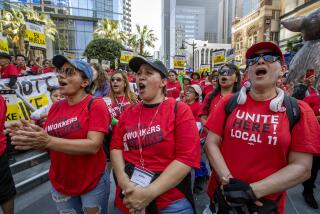S. Africa Firm, Charging Sabotage, Calls in Police to End Strikers’ Sit-in
- Share via
JOHANNESBURG, South Africa — The largest South African mining company, taking a tough new line against striking gold and coal miners, called in riot police Thursday to drive more than 300 workers from a processing plant where they had begun a sit-in.
The giant Anglo American Corp. said that the workers were sabotaging the plant and had already caused more than $2 million in damage. Police fired volleys of tear-gas grenades to disperse the strikers and arrested 23 in the resulting melee that the union called “one of the most violent scenes ever.”
Anglo American also threatened to close as uneconomical a coal mine and one shaft of a major gold mine, with the loss of several thousand jobs, if the five-day-old strike by the National Union of Mineworkers is not ended by Monday.
The company’s own security forces had earlier clashed with strikers at three gold mines where Anglo American said it was protecting miners who wanted to continue working. Eighteen of the strikers were injured at one of the mines when the security forces opened fire with rubber bullets.
The unexpected moves by Anglo American, which considers itself the most progressive of South Africa’s major mining companies, may prompt similar actions by the other firms in an effort to end the work stoppage.
Appears to Be Growing
The strike appears to be growing, with at least 300,000 of South Africa’s 600,000 black miners now participating and more mines and processing plants being hit by walkouts, according to the independent Labor Monitoring Group.
Cyril Ramaphosa, the mine workers’ general secretary, said that about 10,000 more miners had joined the strike Thursday and that 52 gold mines, coal pits and processing plants were affected despite what he described as management and government efforts to break the strike.
The Labor Monitoring Group said it has surveyed 53 gold and coal mines, about half of those in the country, and found that more than 281,000 of the 425,000-man work force were on strike there. Nationwide, the number of miners on strike was well in excess of 300,000, the group said.
The Chamber of Mines, an organization of the six major mining companies, had said that about 230,000 miners were on strike but said that some had returned to work Thursday. The union puts the number of strikers at more than 340,000.
A Test of Strength
The strike, already a historic test of strength between South Africa’s major mining companies and their black workers, has substantially reduced production of gold and coal, which together earn about two-thirds of the country’s foreign exchange.
About 150 union members stopped work Thursday at the Rand Refinery, where gold ore is refined to 99.9% purity and bullion bars are produced for export, in sympathy with the miners, but a plant spokesman said that production had continued with its 190 white staff.
The five-year-old National Union of Mineworkers is seeking a 30% pay increase as well as pay for hazardous work, improved safety standards and better working conditions. The companies unilaterally implemented what they called their final offer of wage increases, ranging from 17% to 23%.
Neither side has made any move to reopen negotiations, which reached an impasse last month, and the union has told its members to prepare for a long and probably bitter strike. About 10,000 of the strikers have left the mines and returned to their homes in remote rural areas.
“We are probably taking the brunt of the strike,” Peter Gush, head of Anglo American’s gold mines, told a press conference. “Virtually all of our mines in all regions are affected. . . . We are talking about significant production losses. . . .”
He declined to give details. Anglo American produced nearly 40% of the country’s gold last year.
Intimidation Reported
Gush contended that increasing numbers of miners have told Anglo American management that they want to resume work, but he said that many were being assaulted or threatened by strikers intent on maintaining and expanding the work stoppage.
He strongly defended the use of the company’s heavily armed security forces to protect miners wanting to work, and he told how they had rescued 40 non-strikers who were held prisoner in union offices at one mine.
Gush and other officials, stressing Anglo American’s desire for good labor relations and an early resolution of the dispute, told reporters that the company would bring in the police only as a last resort.
“If we don’t use (Anglo American’s own security force) and leave everything to the South African police, I can tell you the consequences will be infinitely worse than they are now,” said Theo Pretorius, another Anglo American executive.
Police Enter Plant
As Gush and Pretorius were briefing reporters, however, riot police entered the East Rand Gold and Uranium Co. processing plant, an Anglo American subsidiary at Springs, east of Johannesburg, to enforce a court order evicting 300 miners who began a sit-in on Wednesday.
The strikers had extensively damaged the plant, company officials said, by releasing seven tons of sulfuric acid from a storage tank, draining oil from machinery and cutting off electrical power. But even more damage was done, according to witnesses, when workers saw police moving in and went on an angry rampage.
More to Read
Sign up for Essential California
The most important California stories and recommendations in your inbox every morning.
You may occasionally receive promotional content from the Los Angeles Times.













